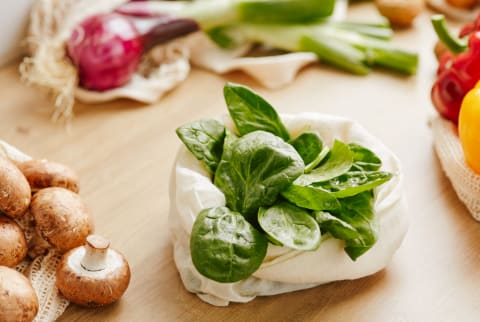Advertisement
3 Tips For Keeping Your Produce Fresher For Longer


It's a sight in the back of the fridge no one wants to see; forgotten (now mushy) strawberries, wilted greens, moldy onions—we could go on.
We're all looking for more ways to eat our fruits and vegetables—but what good is all that produce if it's gone bad before we get to it? Luckily, there are a few things to keep in mind when it comes to the freshness of your fridge, according to integrative medicine and nutrition expert Jaime Schehr, N.D., R.D., that will help you extend the life of your produce picks.
Washing 101.
Before you get home from shopping and head straight to your sink to wash your produce, heed Schehr's very first bit of advice: "I don't wash my vegetables or fruits until I'm ready to eat them," she says. That's because for more vulnerable plants like berries and greens, the water can cause them to break down faster.
"Arguably if they have pesticides, we might want to wash them right away," she adds, "but I'm talking organic, well-sourced fruit and vegetables."
And if you're curious about produce washes, Schehr herself is known to use them. "If it's something I can wash really easily, I'll happily use water," she says, "but often I use a produce vinegar wash. I do notice that speeds up how much the vinegar breaks down the fruit or vegetable, so I don't ever spray it ahead of time, only right before I'm going to eat it."
Just for good measure, the FDA has some cleaning recommendations of their own1, like cutting away damaged or bruised areas on produce, and drying produce with a clean cloth or paper towel to reduce any bacteria.
How to store.
Moving on to storing, you may have wondered about the best ways to store your produce to keep it fresh. Schehr is big on reusable bags that help remove chemicals in the air that make the vegetables decay. "There's so many different brands, but they're basically storage bags for fruits and vegetables," she says, "and I find those are incredibly helpful in preserving things."
For greens, Schehr will specifically wrap them up in a paper towel to help absorb extra moisture. And if it's produce she can trim, like herbs or other greens, "the same way we would with flowers, we want to trim them to allow them to create nutrients easier."
And while not produce-related, Schehr also noted she's a big fan of Mason jars for their airtight seal, which is crucial for dried goods like grains, because they're versatile, sustainable, and durable.
Mind your fridge.
And lastly, but equally important in the life of your fruits and vegetables, is fridge temperature, which you may not think twice about. But Schehr insists on the importance of understanding both the temperature of your fridge compartments and what needs to go where.
"Each refrigerator is a little bit different, but if it's something like meat, you want it to be cold." But on the other hand, "some of our fruits and vegetables, we don't want to be that cold, because it will destroy them," she says.
Speaking of, there's actually a large handful of fruits and vegetables you don't want in the fridge at all because of how the cold can affect texture, flavor, and more.
Unfortunately, produce going bad is a disappointment that can't always be avoided. It's happened to the best of us—but that doesn't mean we can't put a little more effort into produce preservation. And with these helpful tips (plus these for keeping your favorite spices fresh), we can mitigate food waste one bad strawberry at a time.